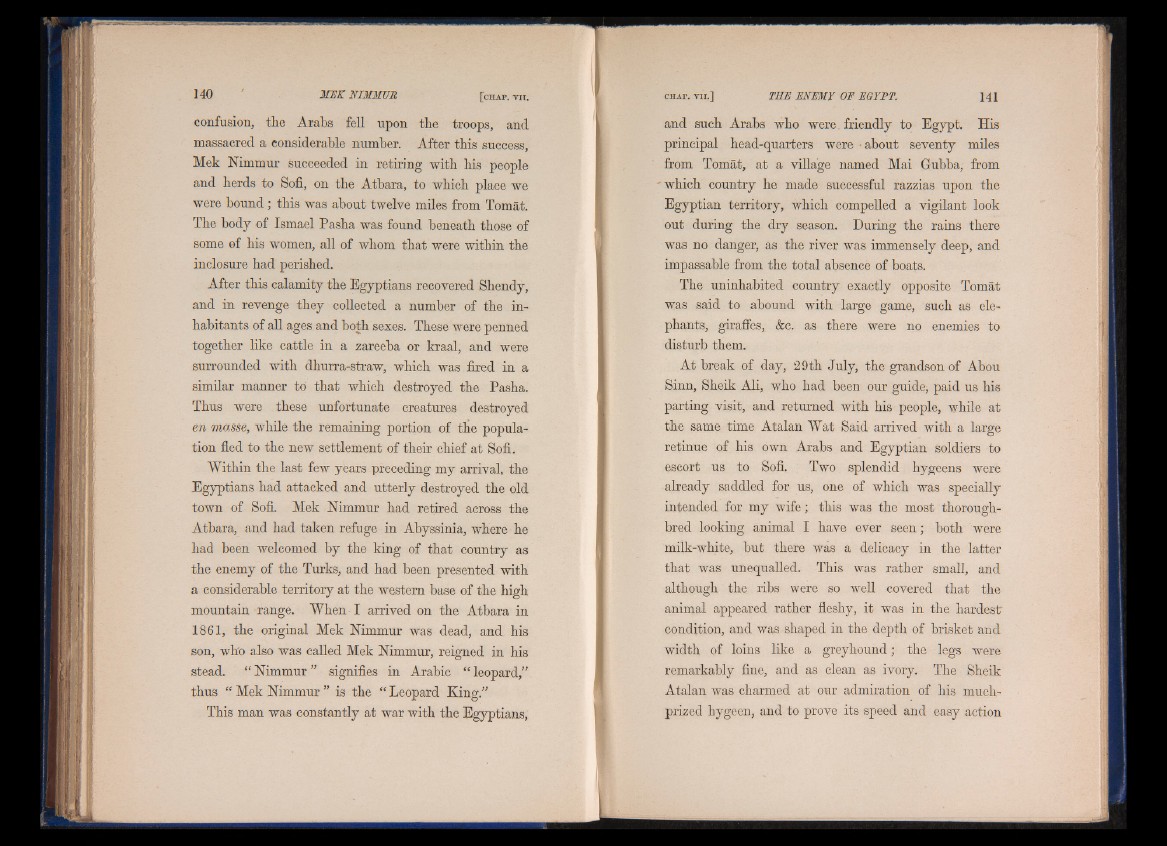
confusion, tlie Arabs fell upon the troops, and
massacred a considerable number. After this success,
Mek Nimmur succeeded in retiring with his people
and herds to Sofi, on the Atbara, to which place we
were bound; this was about twelve miles from Tomat.
The body of Ismael Pasha was found beneath those of
some of his women, all of whom that were within the
inclosure had perished.
After this calamity the Egyptians recovered Shendy,
and in revenge they collected a number of the inhabitants
of all ages and both sexes. These were penned
together like cattle in a zareeba or kraal, and were
surrounded with dhurra-straw, which was fired in a
similar manner to that which destroyed the Pasha.
Thus were these unfortunate creatures destroyed
en masse, while the remaining portion of the population
fled to the new settlement of their chief at Sofi.
Within the last few years preceding my arrival, the
Egyptians had attacked and utterly destroyed the old
town of Sofi. Mek Nimmur had retired across the
Atbara, and had taken refuge in Abyssinia, where he
had been welcomed by the king of that country as
the enemy of the Turks, and had been presented with
a considerable territory at the western base of the high
mountain range. When I arrived on the Atbara in
1861, the original Mek Nimmur was dead, and his
son, who also was called Mek Nimmur, reigned in his
stead. “ Nimmur ” signifies in Arabic “ leopard,”
thus “ Mek Nimmur ” is the “ Leopard King.”
This man was constantly at war with the Egyptians,
and such Arabs who were friendly to Egypt. His
principal head-quarters were - about seventy miles
from Tomat, at a village named Mai Gubba, from
which country he made successful razzias upon the
Egyptian territory, which compelled a vigilant look
out during the dry season. During the rains there
was no danger, as the river was immensely deep, and
impassable from the total absence of boats.
The uninhabited country exactly opposite Tomat
was said to abound with large game, such as elephants,
giraffes, &c. as there were no enemies to
disturb them.
At break of day, 29th July, the grandson of Abou
Sinn, Sheik Ali, who had been our guide, paid us his
parting visit, and returned with his people, while at
the same time Atalan Wat Said arrived with a large
retinue of his own Arabs and Egyptian soldiers to
escort us to Sofi. Two splendid hygeens were
already saddled for us, one of which was specially
intended for my wife; this was the most thoroughbred
looking animal I have ever seen; both were
milk-white, but there was a delicacy in the latter
that was unequalled. This was rather small, and
although the ribs were so well covered that the
animal appeared rather fleshy, it was in the hardest"
condition, and was shaped in the depth of brisket and
width of loins like a greyhound; the legs were
remarkably fine, and as clean as ivory. The Sheik
Atalan "was charmed at our admiration of his much-
prized hygeen, and to prove its speed and easy action